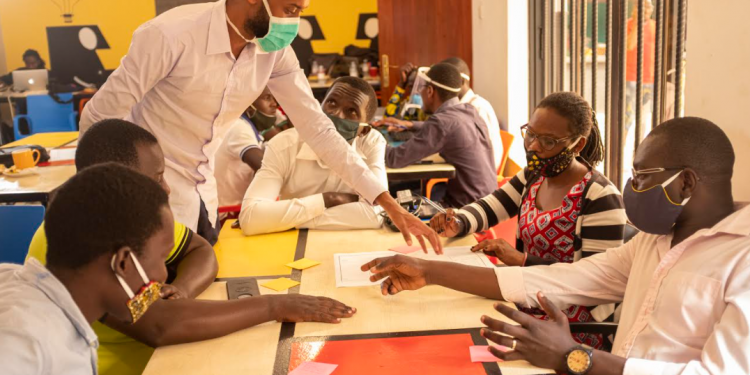In May 2020, the United Nations Capital Development Fund (UNCDF) compiled its findings on the impact of COVID-19 on Ugandan Small and Medium Enterprises (SMEs). The report indicated that only about 15 per cent of surveyed companies could sustain more than three months of operation on their cash flow at the time. The report further indicated that 85 per cent of all Ugandan businesses would be in financial distress after three months of lockdown measures while 50 per cent of informal businesses would be out of business or fall below the poverty line after just one month.
In the same year, The innovation village carried out a survey to find out the impact of COVID-19 on the SMEs within its ecosystem and made the following discoveries. Up to 79 per cent of the businesses that participated in the survey projected that their revenues would decrease in 2020 compared to 2019. Of those, 57 per cent indicated that their revenues would decrease by more than 25 per cent while 22 per cent projected their revenues would decrease by less than 25 per cent. These findings were published in The Innovation Village Impact Report, this year.
There is a general assumption that the lockdown restrictions, limiting contact and movement created a fertile ground for the growth of startups working in Fintech. However, the engagement partner of Financial Technologies Service Providers Association (FITSPA), Zianah Muddu says that the flourishing of Fintechs has not been a given. This is due to the fact that even though other sectors are going digital, Fintechs support various sectors like tourism, education, e-commerce platforms and various kinds of trade. If other sectors are being affected, Fintechs still suffer the brunt since consumers barely have money to transact.
FITSPA, where Muddu works, is a non-profit association that aims to support Uganda’s vision to become a leading Fintech destination. In this period, efforts towards supporting the startups in the financial sector are very crucial.
To encourage startup recovery and prevent the economic gap from widening due to COVID-19, organisations are lobbying on behalf of startups for support in terms of contract financing and speaking to other organisations with relief packages like the COVID-19 relief fund.
Muddu says feedback from Fintechs echoes one common goal, that is, to “survive” the season. At this moment, FITSPA is harnessing the power of community care where they follow up on how they are coping, finding out their needs and then supporting them by seeking options on how to revamp their businesses to full operation.
While FITSPA is doing work to support Fintechs, Startup Uganda is also adding similar efforts in the larger sector of startups.
Startup Uganda, is currently harnessing on Innovation and Entrepreneurship Support Organisations (IESOs) to work together with its members to improve capacities, influence, impact, and create a more enabling environment for innovators and businesses that in turn will drive development across Uganda.
Dona Sava, project coordinator at Startup Uganda says, the lockdown has affected many startups gravely while for others it has only provided a launchpad. Sava points out startups that are using digital platforms such as e-learning, e-payments, healthtech, agritech and those using e-commerce to trade have managed to grow their businesses especially during this lockdown period.
With 30 IESO’s under their umbrella, Startup Uganda went into a partnership with the Innovation Village under the Resilience and Recovery Program (RRP). This is a fully-funded program by Mastercard Foundation to support the various startups to continue working despite the disruption. The support ranged from training to digital support, e-commerce platforms, transport among other things.
This is supplemented by providing investment platforms where they are able to pitch and find funding for their businesses. Depending on their needs, Sava says some startups are only looking for seed funding, while others are looking for funds to scale their businesses. To cater to this, Startup Uganda conducts activities like the Kampala Innovation week, innovation challenges and holds investor days where they have been able to provide these platforms for them.
As businesses go through another rough patch due to the lockdown, all across the board, there is a need to contribute towards ecosystem efforts towards the survival of MSMEs in every sector.
Once again, The Innovation Village is taking a lead on building resilience among entrepreneurs through working with entrepreneurs in cities across central, east, north and Western regions of the country. The work involves providing support in form of funding, mentorship, skilling and digital markets to entities that are leveraging technology to solve critical problems in agriculture, health, education, tourism, media, supply chain, energy, finance and manufacturing.










